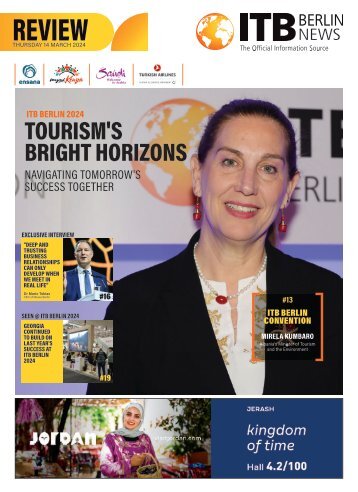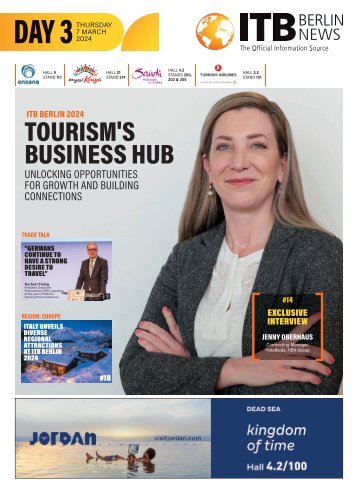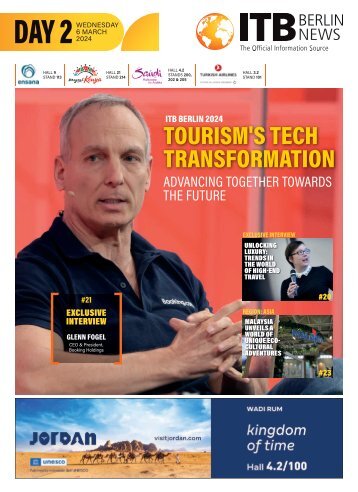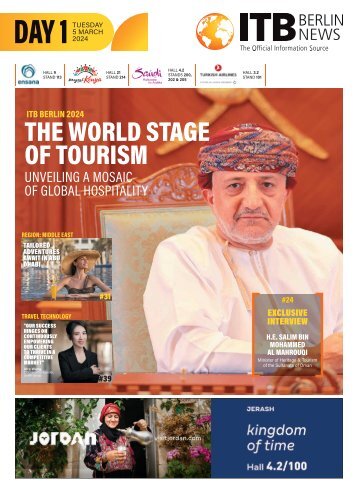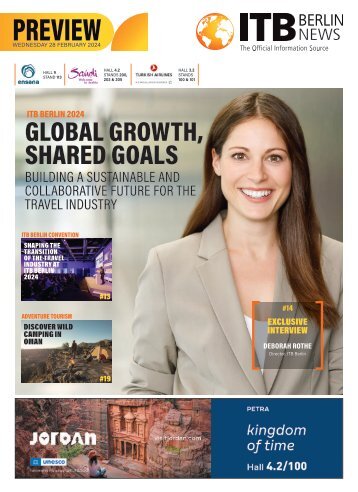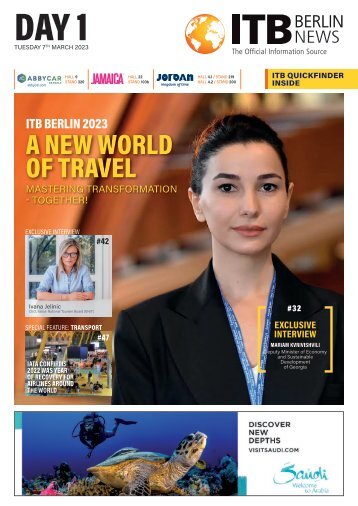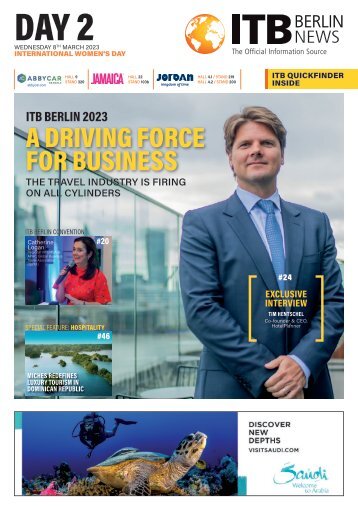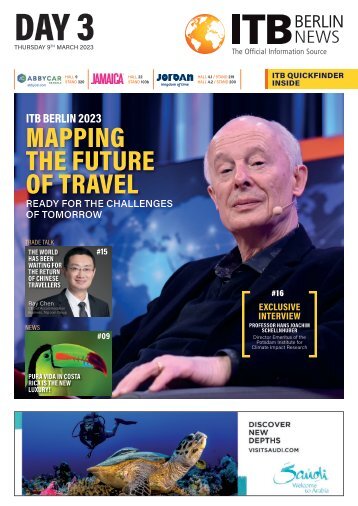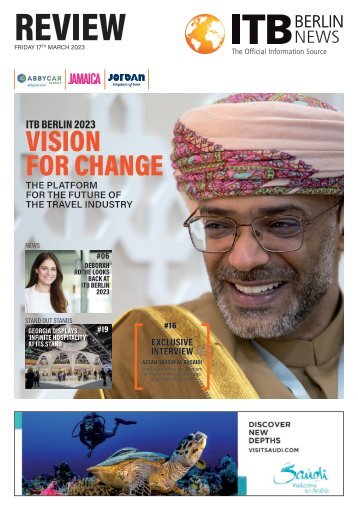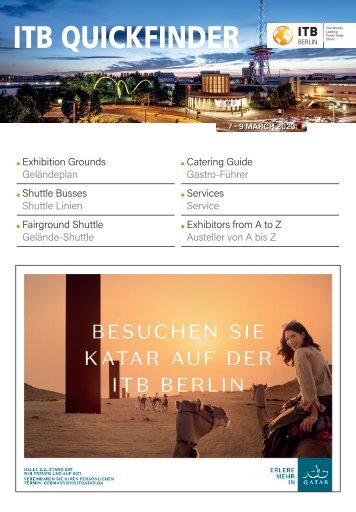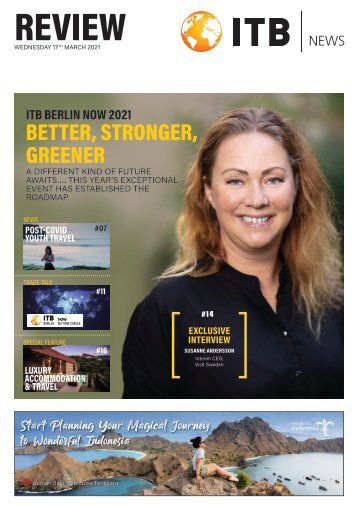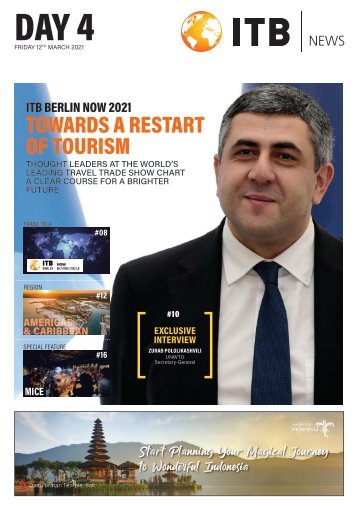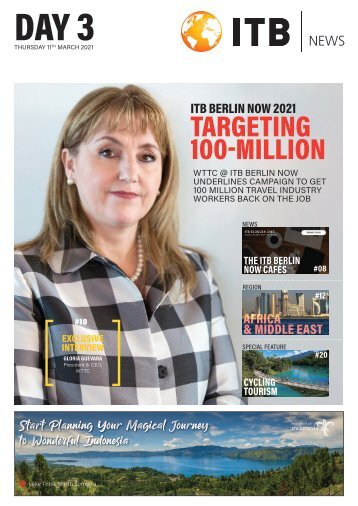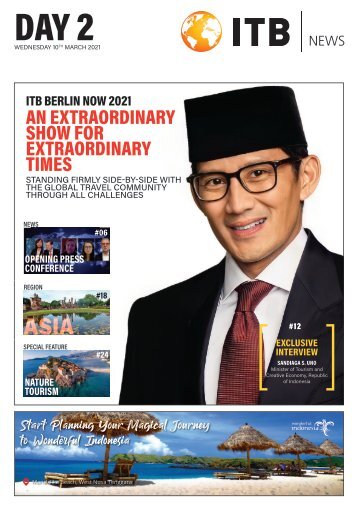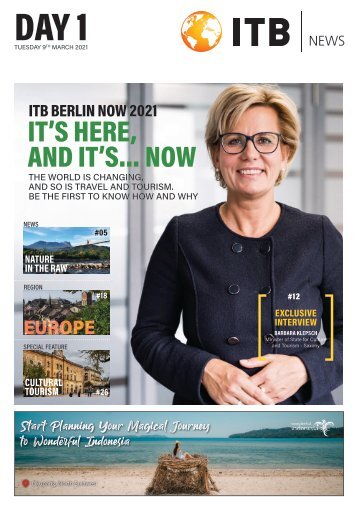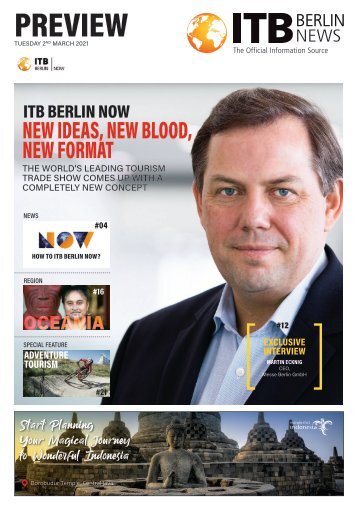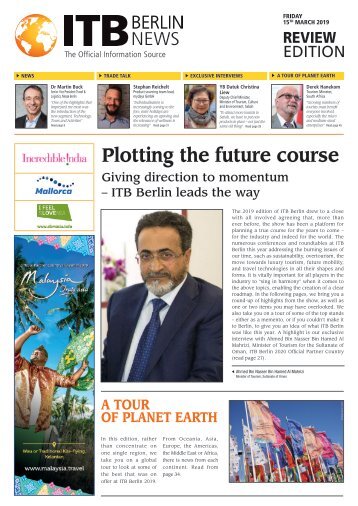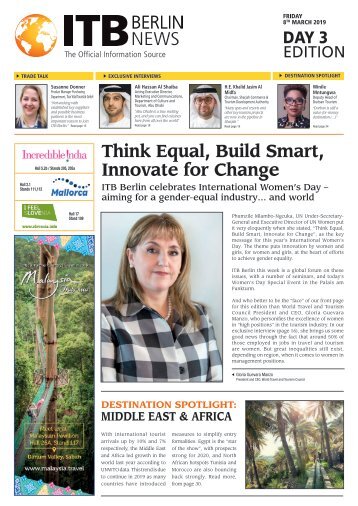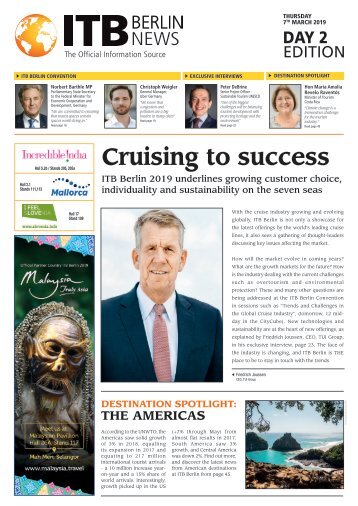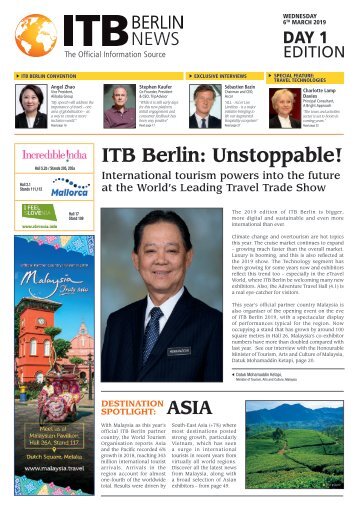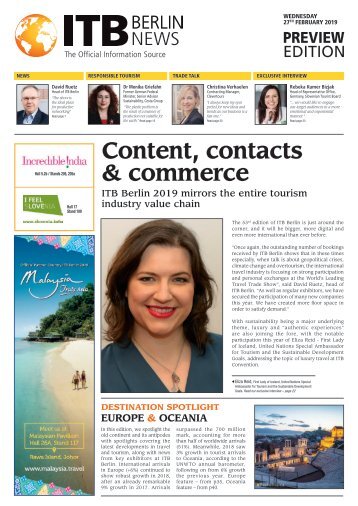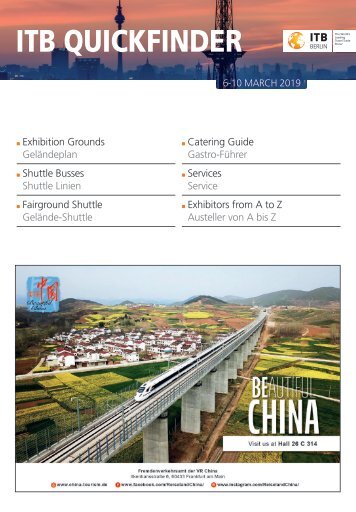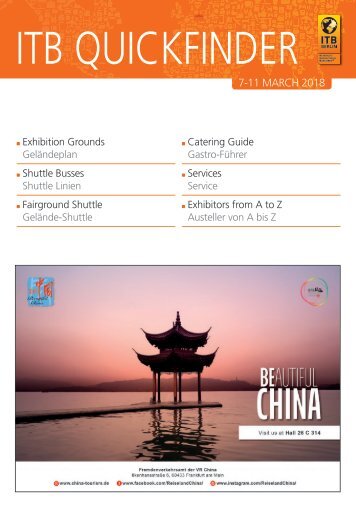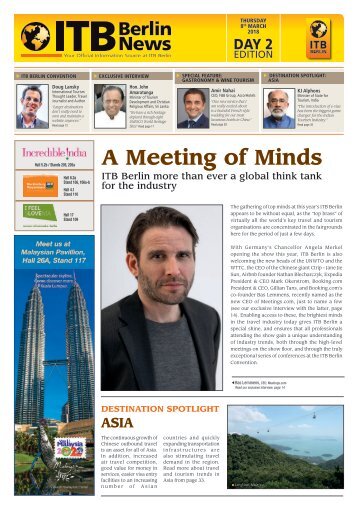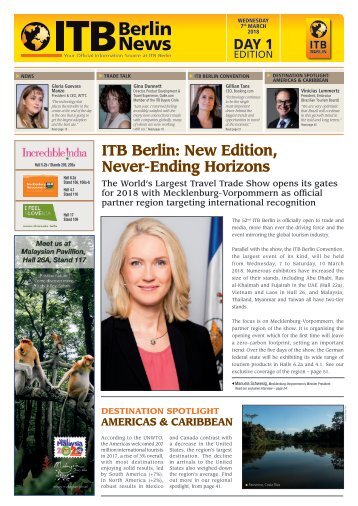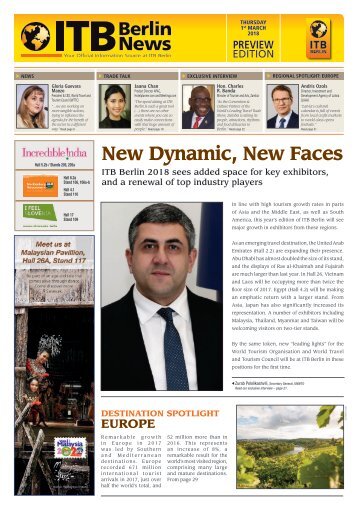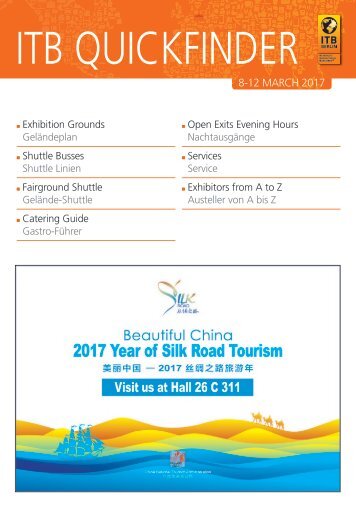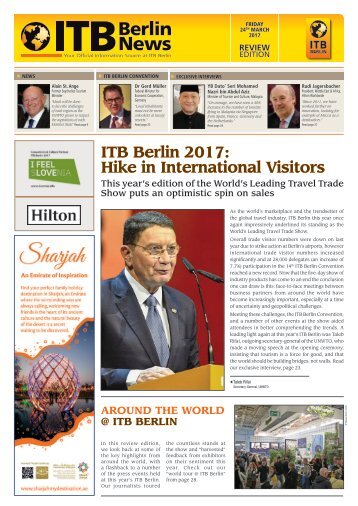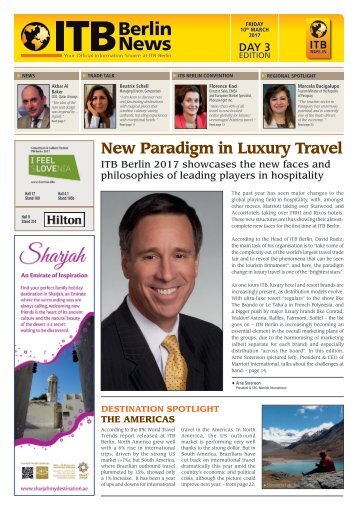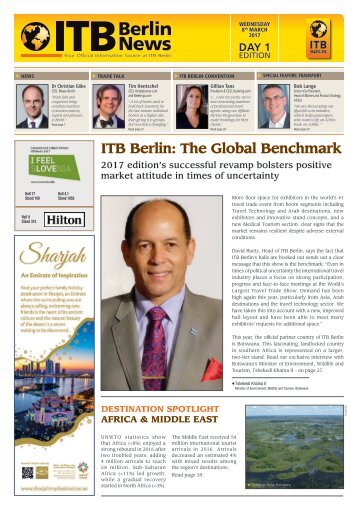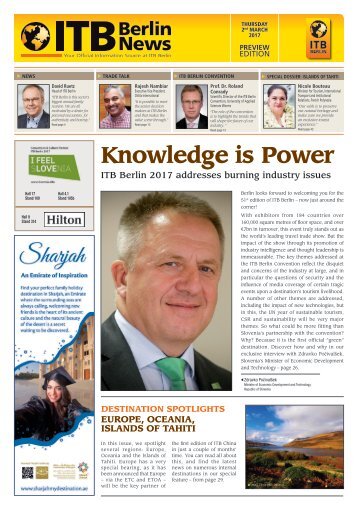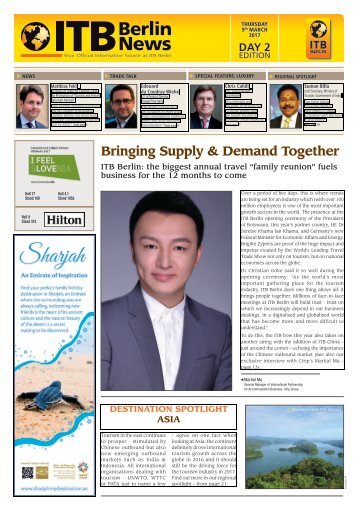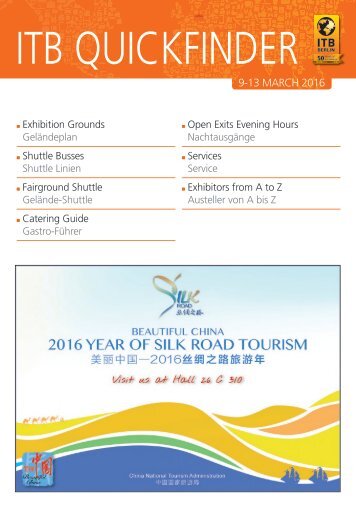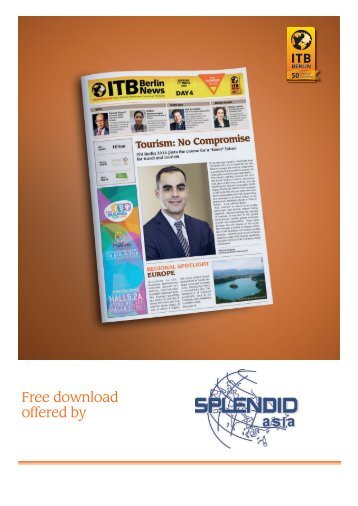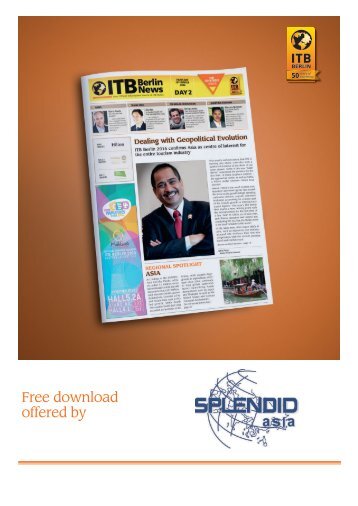
ITB Berlin News - Day 4
- Text
- Berlin
- Tourism
- Visa
- Destination
- Brazil
- Mice
- Cultural
- Tourist
- Destinations
- Region
- Www.cleverdis.com
10 EXCLUSIVE INTERVIEW
10 EXCLUSIVE INTERVIEW On Taxes, Visas and Economic Development WTTC President and CEO David Scowsill sets the tone – outlining industry sweet spots and stumbling blocks The importance of advocating by the WTTC is underlined by the fact that there are currently around 260 million people working in tourism worldwide, and the sector accounts for 9% of global GDP. In the next ten years, this figure is set to grow to 10% of Global GDP. For its part, the WTTC works with the private sector on a global scale, and advocates alongside the UNWTO with a number of nations’ presidents and prime ministers on key issues affecting them. Apart from their research and events, the WTTC concentrates on such things as visas, jobs and taxes, and there has been major progress in these areas in recent times. We asked to David Scowsill, President & CEO of the World Travel & Tourism Council what the key areas are and which steps forward are being made… David Scowsill President & CEO, World Travel & Tourism Council David Scowsill is President & CEO, World Travel & Tourism Council. Before taking up his role at WTTC, he worked in most parts of the world for some of the biggest names in travel. David has been CEO of Opodo; vice chairman of Worldhotels; senior VP of sales, marketing and IT at Hilton International; managing director EMEA at American Airlines; regional general manager Asia/Pacific at British Airways; and sales and marketing director at easyJet airlines. It’s fantastic to see what is happening in ASEAN – with regards to visas. Some of the things that are happening in this part of the world should be transported to Latin America and Europe when it comes to simplification of visas. Cambodia, Laos, Myanmar and Vietnam recently announced that they will introduce a single visa, which is fantastic. Cambodia and Thailand are also taking steps towards producing a single visa. As an industry, what we want is a smart visa system and that means we want electronic visas now; we want visa on arrival now; we want single visas for geographic territories. Looking back at the past twenty years of terrorism incidents, how many terrorist attacks were driven by someone who happened to have a tourist visa to a particular country? None at all. And as Taleb Rifai is very fond of saying when we see presidents and interior ministers, “Do you want people to come to your country, or do you want to keep them out? You have a straight choice, but at the moment in your particular country, Mr President, Mr Prime Minister, you are keeping them out!” And one example of that was the What we want is a smart visa system and that means we want electronic visas now; we want a visa on arrival now; we want single visas for geographic territories. United States. After pushing very hard with the Obama administration during about 18 months, with all the CEOs of the WTTC companies going into Washington DC, eventually the President got the message that the US had lost 0 billion of income over ten years because of their security policy and screening at the airports. Finally, President Obama instructed the State Department to speed-up Visa processing from China and Brazil. It’s a small step, but we see it happening all over the world thanks to this pressure. Taxation is another issue. Who are the worst offenders, in terms of taxation? Without doubt, the UK government. If you think about it, there are about four things the UK government is doing to prevent Travel & Tourism. The first is its air passenger duty, which is the highest in the world of its type. Our research shows that the UK treasury gets 2.8 billion pounds income through this air passenger duty, and we believe they are losing 4.2 billion pounds of GDP growth and some 90-thousand jobs by having this particular taxation in place. The VAT rate in hotels and restaurants at 20% - that’s also very high. The third area is visas. If you are coming from Asia to Europe – particularly out of China or Korea – why would you go to the UK, when you can get one Schengen visa for multiple countries? Why would you put yourself through the pain of going to the UK consulate to get a second visa just to go and visit London with the extra expense involved? [Interview by Bob snyder] ITB BERLIN NEWS • Saturday 9 th March 2013 www.itb-berlin-news.com
EXCLUSIVE INTERVIEW 11 Foreign Trade Visitor Numbers on Rise ITB Berlin augments international influence with boost in figures of international visitors In an ever more complex global market – where tourism plays a growing role in national economies, ITB Berlin underlines its international vocation. Dr Martin Buck, Director Competence Center Travel & Logistics, Messe Berlin told ITB Berlin News that he has noted an increase this year in the ratio between international and national buyers. We have now reached over 45% of buyers coming from abroad. This is an increase of about two percentage points over last year. On the other hand, the total number of trade visitors is at around the same level as last year. We are not so concerned about this as we have obviously just reached critical mass. Hence the traditional slogan of Messe Berlin – “everybody is here”! It’s difficult to increase this further, and I am very satisfied. Furthermore, every day, we do surveys on visitors. One question is about the intention to return, and this has risen from around 78% last year to 86% this year. Bas One is that we will start selling to individual customers on the weekend this year. The second important topic is that we are planning a new “incoming” show in Egypt in 2015… and we have signed a letter of intent. What have the main trends been this year? There are two key trends. The first is mobile and online media, social media and everything that can be shown on a smartphone. Consequently, the eTravel World conference stream at the ITB Berlin Convention has seen an increase in the first two days from around 900 attendees last year to over 2,300 this year. People want to know how the eTravel world functions, how they can contribute, and how they can make money out of it. The second trend is that product niches are becoming more important. The classic sun and beach convenience product is always going to be in demand, but things like gay and lesbian travel is becoming more important, as is adventure travel. Travellers want to go to places they have never been before. They are interested in learning something new, and want to confront themselves with nature in a way that is perhaps not feasible when you go to a resort. What are your impressions with the level of attendees this year? When we are talking about the ministers, I am very satisfied. Through our cooperation with the UNWTO, they ran their third Silk Road ministers’ meeting here on Wednesday. Dr Martin Buck Director Competence Center Travel & Logistics, Messe Berlin face at big functions, but it also gives the possibility to attend workshops, where these dignitaries can also absorb state of the art knowledge which is of vital importance. Finally, what is your message to future attendees? own situation. This is a big advantage compared to what was possible a decade ago, when you would have had to engage consultants, or to bring in journalists for a press trip, not knowing the quality of what they might write. It has never been so possible to manage your (…) we are planning a new “incoming“ show in Egypt in 2015 The minister from Azerbaijan (our cultural and convention partner) opened our convention, and of course at the opening ceremony there were so many ministers, it would be difficult to estimate. The crucial point is that more and more tourism ministries recognise that at ITB Berlin it is not just about showing one’s Try to derive your customer offering not only from your own beliefs, but try to really get in touch with the customer, and understand what he or she wants. The chances to do this have never been better than today, because by establishing your own community – in Facebook for example – you can do this in a customised way that reflects your own information gathering process, to transform information into something that is attractive for the customer and immediately gain feedback on that again. [Interview by Richard Barnes] ITB BERLIN NEWS • Saturday 9 th March 2013
- Page 1: SATURDAY 9 th MARCH 2013 DAY4 EXCLU
- Page 7: NEWS 7 Maria Mutagamba Ugandan Mini
- Page 12 and 13: 12 REGION AMERICAS Encouraging Resu
- Page 14 and 15: 14 REGION AMERICAS The “On Switch
- Page 18 and 19: 18 REGION ADVERTORIAL AMERICAS Jet
- Page 20 and 21: 20 REGION AMERICAS The Americas The
- Page 22 and 23: ITB BERLIN NEWS • Saturday 9 th M
- Page 25: RESPONSIBLE TOURISM 25 Wellbeing An
- Page 29 and 30: Ha l 12 Stand 101 this city? in Ber
Inappropriate
Loading...
Mail this publication
Loading...
Embed
Loading...
